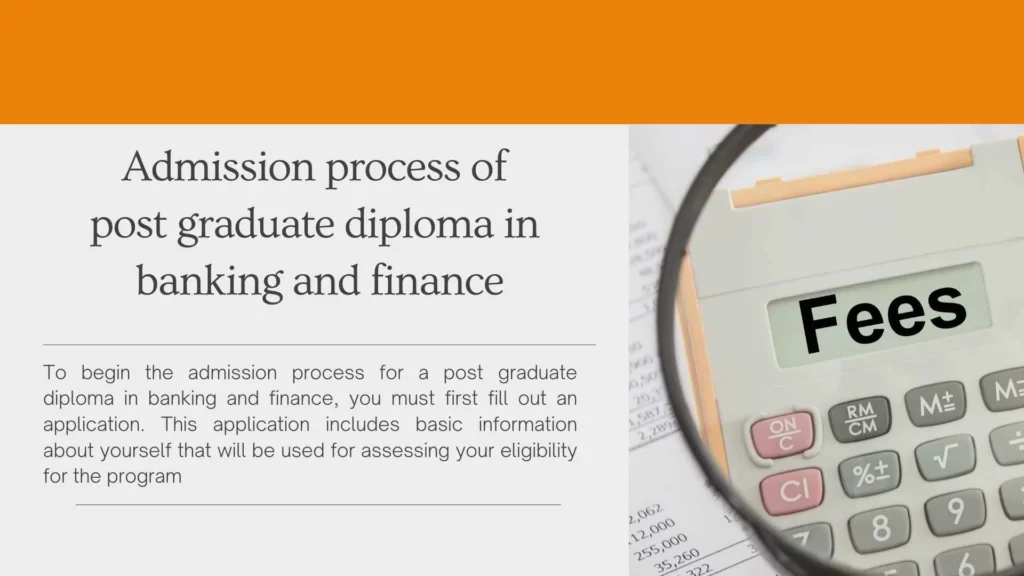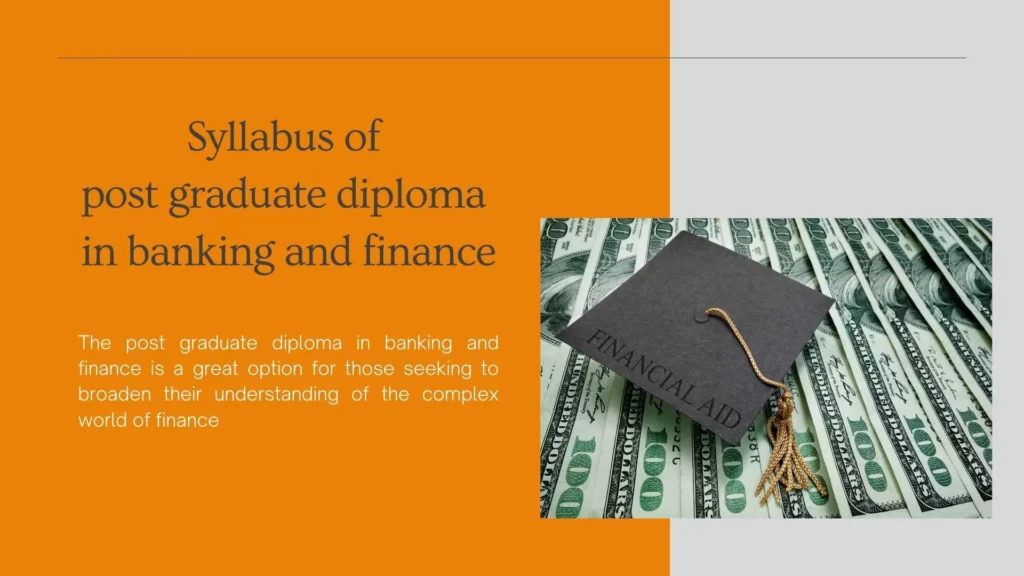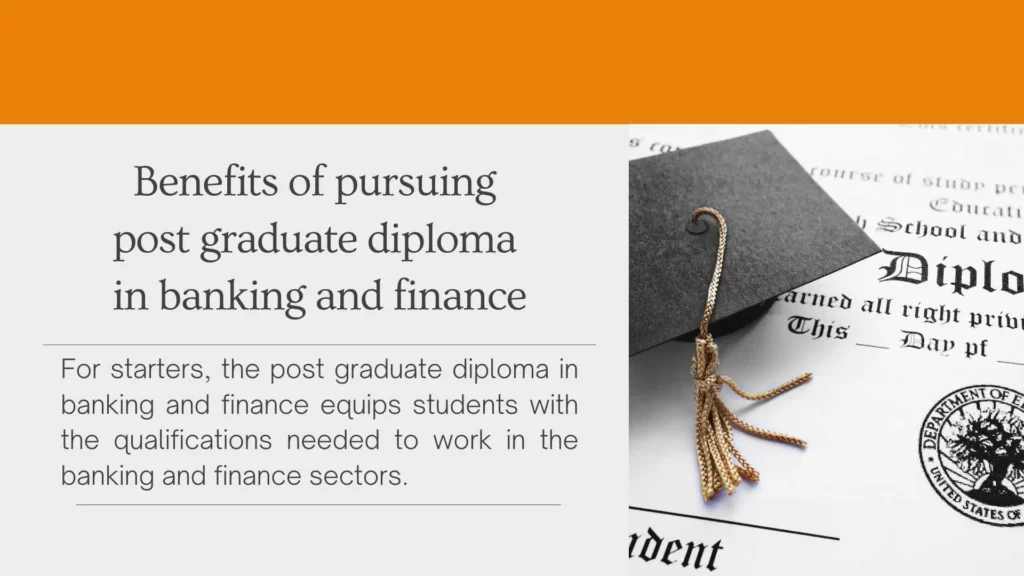Introduction
The study of banking and finance provides the knowledge and skills to work in the professional environment of the financial industry. This post graduate diploma in banking and finance will give you an in-depth understanding of the principles, concepts and practices in this field.
At a high level, a post graduate diploma in banking and finance covers a variety of topics like capital markets, equities Investing & Trading, loans & debentures, risk management and alternative investments. Additionally, you’ll acquire valuable skills such as data analysis, critical thinking, forecasting and modelling that are essential for a successful career in banking and finance.
Not only will this post graduate diploma in banking and finance help you gain deep insights into the world of banking and finance, but it also offers clear career development opportunities. On successful completion of the qualification, you could find yourself working as an Investment Banker or Financial Analyst at one of the top banks or financial institutions. You may also advance to become a Corporate Treasurer or Stockbroker thanks to this postgrad diploma.
In sum, studying for your Post Graduate Diploma in Banking and Finance can open up diverse opportunities for you within the world of finances. It teaches you both theoretical knowledge as well as practical experience that can be catered to your desired career path in this sector.
Admission process of post graduate diploma in banking and finance

Taking the steps towards furthering your education is an important decision, and understanding the admission process can help ensure you are adequately prepared for your post graduate diploma in banking and finance. We’ve outlined the key points of the admission process to provide you with detailed information on how to apply and what qualifications you need to pursue your post graduate diploma.
To begin the admission process for a post graduate diploma in banking and finance, you must first fill out an application. This application includes basic information about yourself that will be used for assessing your eligibility for the program. After submitting your completed application, you should submit a variety of documents as part of the admission process, such as a statement of purpose, transcripts from previous studies, letters of recommendation, and other documentation as required by the program.
In addition to an application and supporting documents, certain qualifications are also required in order to pursue a post graduate diploma in banking and finance. You should have an undergraduate degree related to finance or economics to be eligible for the program. Depending on the school or program, you may also need to pass certain entrance exams or take part in an interview before being accepted into the program.
The fee payment details will vary depending on which school or program you choose; however, they will include tuition fees as well as additional costs such as textbooks and materials. Be sure to review all payment requirements carefully before proceeding with any payments.
The curriculum of a post graduate diploma in banking and finance typically covers topics like asset management, corporate finance, investment analysis, entrepreneurship & business development planning amongst others.
Eligibility criteria for post graduate diploma in banking and finance

To be eligible for this post graduate diploma in banking and finance, there are certain requirements that need to be met.
First off, you’ll need to have a university degree in finance or a related field such as accounting, economics, or business administration. Having a solid foundation in these areas will give you a strong understanding of the concepts central to banking and finance.
In addition to having a university degree, prospective candidates should have some knowledge of banking and finance principles. This could come from experience with banking activities such as managing assets or working with customers on loan applications. Understanding key financial metrics like interest rates and yield curves is also helpful when forging ahead with postgraduate studies.
Computer skills are highly valued by employers in the banking and finance sector, so this should be something that prospective students look into when considering their post graduate diploma program. The ability to interact confidently with computers will help you troubleshoot problems quickly and efficiently, as well as analyze vast amounts of data for decision-making purposes. Also, make sure that your basic mathematical aptitude is up to par!
Analytical thinking is another important aspect of succeeding in a post graduate diploma program for banking and finance as it helps you make sense of complex situations and develop solutions for them. It’s also essential that prospective students possess strong communication skills so that they can effectively explain their conclusions to others in order to advance decisions or strategy plans within the organization they work for.
Have a look at the best investment banker course
Syllabus of post graduate diploma in banking and finance

The post graduate diploma in banking and finance is a great option for those seeking to broaden their understanding of the complex world of finance. This highly professional program emphasizes a deep dive into the fundamentals of finance, investment banking, risk management, banking and financial services, accounting and auditing procedures, financial statement analysis and economic and banking regulations.
From learning the basics such as financial mathematics to understanding corporate governance structures under relevant regulations, this course covers all aspects of modern-day business banking.
You will get a clear understanding of equity derivatives instruments like futures and options contracts along with their practical applications in the real world. This diploma focuses significantly on market microstructure studies which provide you with an advanced knowledge base from which to make informed decisions in asset management.
The course offers a wide range of theoretical foundations for businesses ranging from risk management strategies adopted by banks to hedging tools you can use for insuring against losses.
This diploma also provides analytical modules designed around practical industry problems such as debt capital markets analysis, credit assessment analysis and rating derivatives trading strategies. Additionally, you will develop the skills required to analyze company balance sheets in depth through accounting & auditing procedures so that you can make well-informed decisions when it comes to investments.
By pursuing this post graduate diploma in banking and finance you will also gain a comprehensive overview of financial statement analysis which includes how management accounts are written up according to international standards; how competition analysis can be used as part of a company’s SWOT; how economic conditions impact portfolio selection; using tax planning advice; understand economic & banking regulations both domestically & globally; and learn about advanced capital budgeting techniques employed by banks & financial institutions for evaluating projects.
Also, Give a visit to the best PG Program In Financial Modelling with PLACEMENT GUARANTEE
Fees of course for post graduate diploma in banking and finance
If you’re considering a post graduate diploma in banking and finance, it’s important to consider the fees associated with the program. Understanding the cost of the program can help you plan and budget accordingly. Depending on the university or institution you plan to attend, course fees may vary. Understanding the cost structure of your chosen program will help you make an informed decision as you plan for your educational future.
Most institutions provide students with several payment options when it comes to paying for their tuition fees. These may include instalment plans and flexible payment options to suit different budget constraints.
It is important to look at all of these options before committing to one particular choice so that you can find the best solution for your financial situation. Additionally, some institutions also offer scholarships or financial aid loans that may reduce tuition costs significantly. Moreover, some banks offer special loans for students who are pursuing post graduate diplomas in banking and finance.
When it comes to budgeting for your degree, it’s important not only to consider tuition fees but also additional costs such as textbooks and materials needed for the coursework.
While these items may be relatively inexpensive in comparison to the tuition fees, they should still be taken into account when budgeting for your program. Furthermore, there may also be additional costs such as travel expenses if you are planning on attending online classes outside of your local area or housing costs if you choose to pursue a full-time degree away from home.
When it comes to covering tuition for this kind of post graduate diploma in banking and finance, there are several payment options available. You can use personal savings, take out a student loan, or look into financial aid from your local government or educational institutions. There are also scholarship opportunities available for those who meet certain criteria such as academic excellence or an outstanding portfolio of work experience.
Budgeting is always important when it comes to investing in your future and a post graduate diploma in banking and finance is no exception. Before you commit to the course, make sure that you have done your research and worked out how much you can afford to spend on tuition fees each month. This way you can be sure that you are getting the best value for money while still enjoying learning within your budget constraints.
These tips should help you plan financially for enrolling in a post graduate diploma in banking and finance. Good luck!
Job Roles after Diploma

Do you have a post graduate diploma in banking and finance? Congratulations! With this sought after qualification, you’ll have access to many exciting career opportunities within the banking sector.
Upon completion of your postgraduate diploma, you might consider a job as a financial advisor. Financial advisors help clients make informed decisions about their investments. They assess the financial goals of each client and then offer tailored advice on how to best reach those objectives. Being a financial advisor requires good communication skills, comprehensive knowledge of regulations and laws, and an understanding of the financial market.
Perhaps you’re interested in pursuing a role as a commercial banker? As a commercial banker, you’ll be responsible for managing investments for companies or organizations. You’ll also provide insight into business operations like cash flow management and loan applications. To become a commercial banker, strong analytical thinking skills are essential along with excellent customer service skills.
If managing investments isn’t your goal, then consider becoming an investment analyst! Investment analysts use data analysis to assess potential investment opportunities for shareholders or clients. A successful analyst must be able to identify market trends and accurately interpret financial statements to better understand risk levels associated with certain investments. Also, they need to have strong research skills so that they can gather relevant information quickly and efficiently.
You may also want to consider working in risk management or corporate advisory roles within the banking industry after completing your postgraduate diploma in banking and finance.
In these roles, you’ll be responsible for evaluating the potential risk associated with different events or conditions within the sector or company operations. It’s essential that you have an understanding of regulations related to risk management such as Solvency II or Basel III standards since these will determine how businesses manage their risks.
Benefits of pursuing post graduate diploma in banking and finance

Pursuing a post graduate diploma in banking and finance can open many doors for students looking to advance their skills and career. It offers the opportunity for increased professional qualification, financial expertise, and knowledge of the industry — all through a structured learning environment.
For starters, the post graduate diploma in banking and finance equips students with the qualifications needed to work in the banking and finance sectors. The practical job skills taught in these courses provide real-world know-how that can be used immediately upon graduating. Students are also given access to top employers and recruiters, giving them a competitive edge when applying for jobs in their field of study.
With this post graduate diploma in banking and finance, students gain more than just professional qualifications; they also learn essential financial expertise. Being familiar with relevant economic trends helps individuals become wiser when it comes to investing, whether it be in the stock market or other financial instruments. They also acquire deep knowledge of how financial institutions operate which is invaluable information when managing one’s personal finances or working in finance management roles.
Moreover, graduates have the opportunity to build networks within their respective industries. For example, internships during their studies give students exposure to the workplace which opens up opportunities for future collaborations on projects or partnerships with employers. By cultivating industry relationships during one’s academic journey, individuals gain valuable connections that may lead to job openings with great employers down the line.
Having a post graduate diploma in banking and finance demonstrates your proficiency in the field and can give your resume an edge over others who don’t possess this qualification. It will help you learn more advanced concepts related to the banking and finance industry, so you can stay ahead of the competition when it comes to job opportunities.
By investing in a post graduate diploma in banking and finance, you will gain access to many of the top employers and recruiters within the industry. They know that anyone who has invested time and money into pursuing such an education is likely to have more advanced skills than someone without this background. This makes them more attractive candidates for career opportunities.
A postgraduate diploma in banking and finance also gives you the opportunity to further advance your career potential by allowing you to specialize in certain aspects of the industry depending on your interests. Whether you’re interested in corporate finance or international trade, having a specialized qualification gives you a competitive edge when looking for jobs and promotions within the field.
Ultimately, having a post graduate diploma in banking and finance is essential for those looking for successful careers within this industry. It provides increased access to employers and recruiters, as well as gives professionals an opportunity to specialize their skillsets for future advancement potential.
Also, Give a visit to the best PG Program In Investment Banking with PLACEMENT GUARANTEE
Salary Expectations

Salary Expectations: After completing your post graduate diploma in banking and finance, you can expect to earn significantly more than the base wage for entry-level financial services professionals. Depending on what role you pursue and other factors such as experience level and location, salaries can range from $50k-$80K.
Professional Qualifications: Completing a postgraduate diploma in banking and finance will equip you with the specialized skills and qualifications necessary for senior positions within the banking industry. This includes certifications such as CFA (Chartered Financial Analyst), FRM (Financial Risk Manager), CMA (Certified Management Accountant) or CIA (Certified Internal Auditor). Having these qualifications increases your employability prospects while also helping to increase your salary package.
Industry Knowledge & Skills: You will gain an in-depth understanding of financial management principles, risk management techniques, investment opportunities and industry practices. You’ll also be able to develop problem-solving skills which will help increase efficiency within a financial organization/institution.
Employability Prospects: With a post graduate diploma in banking and finance under your belt, organizations are much more likely to take notice when recruiting personnel for higher positions within their business activities. Your expertise will be seen as highly valuable making it easier for organizations to trust in your abilities when it comes to managing their finances.
This post graduate diploma in banking and finance program provides an in depth view of the financial sector and prepares students to work with both private and public organizations. Through this course, you’ll develop the skills needed to manage finances, assess financial strategies, analyze current market trends, identify investment opportunities, and determine the best options for businesses and clients. This program also covers topics like banking regulation & compliance, asset pricing theory, risk management & hedging strategies, and international finance.
Completing such a rigorous post graduate diploma in banking and finance requires hard work and dedication; however, it is worth it as upon graduation you will have access to better opportunities and higher salary packages. Furthermore, employers recognize that someone who has taken the initiative to complete this postgraduate program is likely to be more qualified as compared to others in their field for similar positions.
Conclusion
A Post Graduate Diploma in Banking and Finance will give you the skills, knowledge, and confidence to move forward with your goals. In India, a Post Graduate Diploma in Banking and Finance provides an overall understanding of the financial sector.
This post graduate diploma in banking and finance program includes modules on economic principles, financial analysis and markets, risk management strategies, investment options, accounting principles, and banking operations. This program is designed to equip you with the tools needed to succeed in a competitive field such as finance.
You will gain an understanding of the legal framework that governs banking operations as well as industry best practices. You’ll develop core competencies in areas such as data analysis for decision-making and strategic management of finances. Additionally, you’ll learn about market trends that drive business decisions.
The program is designed to teach students how to identify opportunities for investments and how to explore new sources of financing. Moreover, it will help you develop essential problem-solving skills that are essential for success in any financial setting.
These days many banks offer internships that can be taken up by people doing a Post Graduate Diploma in Banking and Finance. Internships help students gain experience while learning valuable skills at the same time. It also enhances their employability prospects when they apply for jobs after completing their coursework.
A Post Graduate Diploma in Banking and Finance is highly respected in India since it equips professionals with all the necessary tools needed to excel in banking and finance sector-related careers. It helps professionals explore various roles available such as credit risk analyst or portfolio manager or even venture into international banking if they choose so!
Frequently Asked Questions
A Post Graduate Diploma in Management (PGDM) in Investment Banking and Capital Markets is equivalent to an MBA. Completing this course will also earn you certifications from the Post Graduate Certificate in Management (PGCM) and the National Skill Development Corporation (NSDC). It is one of the best available diplomas for those looking to pursue a career in banking and finance.
Yes, the Post-Graduate Diploma in Banking and Finance opens up many job opportunities in banking, commercial banking, auditing and the financial system.
People with a PGDB degree can pursue banking, financial advisory, and business analyst roles. These positions typically pay well and have high job demands.
Companies hiring a PGDM in Finance graduate typically offer a salary of between 5 and 10 lakhs per annum for entry-level positions.
Following are some of the options
- MBA in Banking and Finance
- MBA in Banking and Finance.
- MBA in Global Banking and Finance.
- MBA in Islamic Banking and Finance.
- MCom (Banking)
- M.Sc. in Banking and Finance.
- M.Sc. in Financial Services in Banking.
- M.Sc. in Finance Banking and Insurance.
- M.Sc. in Banking and Risk.
The following are the top postgraduate courses in banking: Master of Science in Banking and International Finance, Master in Management with a specialization in Banking and Asset Management, MSc Banking and International Finance, MSc in Finance with a focus on Banking and Risk Management, and MSc in Banking, Financial Technology (Fintech) and Risk Management.
To apply for a job in banking, you must have a bachelor’s degree in commerce or another management-related field. Additionally, you should prepare for the bank exam by brushing up on quantitative aptitude, general awareness, reasoning, English, and basic computer skills.
The average annual salary of PGDM Students in India is ₹ 3.6 Lakhs, ranging from ₹ 1.8 Lakhs to ₹ 8.0 Lakhs. This estimate is based on the 119 most recent salaries received from PGDM Students.
The average salary for an MBA Finance fresher in India is ₹2.4 Lakhs per year. Salaries can range from ₹0.2 Lakhs to ₹21.1 Lakhs, based on 305 recent salaries reported by MBA Finance freshers.
PGDM courses are more practical than MBA programs, which are more theoretical. PGDMs also provide extra support in the form of mentorship and industry exposure. Placement services for PGDM programs are also more rigorous, making them a good choice for those seeking higher salaries. To get the most out of a PGDM program, it’s best to choose one from a recognized institute.





